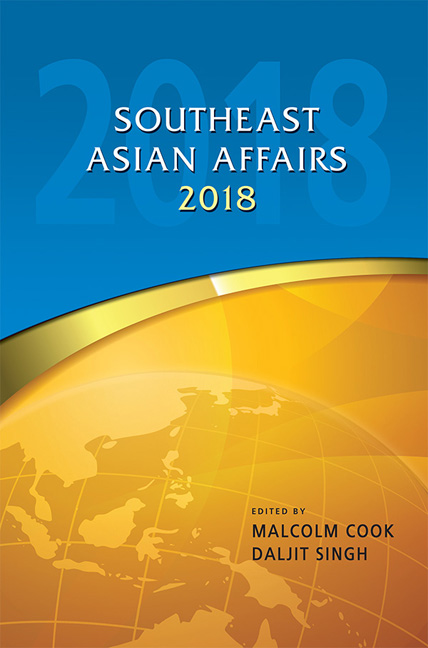Book contents
- Frontmatter
- Contents
- Introduction
- Acknowledgements
- THE REGION
- BRUNEI DARUSSALAM
- CAMBODIA
- INDONESIA
- LAOS
- MALAYSIA
- MYANMAR
- THE PHILIPPINES
- SINGAPORE
- THAILAND
- Thailand in 2017: Stability without Certainties
- Haunted Past, Uncertain Future: The Fragile Transition to Military-Guided Semi-Authoritarianism in Thailand
- Thailand's Southern Insurgency in 2017: Running in Place
- TIMOR-LESTE
- VIETNAM
Thailand in 2017: Stability without Certainties
from THAILAND
Published online by Cambridge University Press: 08 June 2019
- Frontmatter
- Contents
- Introduction
- Acknowledgements
- THE REGION
- BRUNEI DARUSSALAM
- CAMBODIA
- INDONESIA
- LAOS
- MALAYSIA
- MYANMAR
- THE PHILIPPINES
- SINGAPORE
- THAILAND
- Thailand in 2017: Stability without Certainties
- Haunted Past, Uncertain Future: The Fragile Transition to Military-Guided Semi-Authoritarianism in Thailand
- Thailand's Southern Insurgency in 2017: Running in Place
- TIMOR-LESTE
- VIETNAM
Summary
Thailand in 2017 has been relatively stable, despite the fact that a decade-long political struggle has not come to an end. In fact, a widely anticipated process of national reconciliation has never taken place; hence, tensions between contending groups will continue to challenge Thailand in the immediate and long-term future. Despite this there were several important factors in 2017 that helped contain the conflict and which, in turn, maintained the stability of the military government. Such stability has, first and foremost, been preserved by restrictions on political freedom in the kingdom. The death of King Bhumibol in October 2016 and the year-long period of mourning, during which political activities were deemed inappropriate and socially unacceptable, further silenced opposition voices.
However, with the military holding power and the political bargaining between elites in different factions still unsettled, uncertainties cloud the future of Thai democracy. Illustrative of such uncertainties is the case of the charges against former prime minister Yingluck Shinawatra in the latter half of 2017 for negligence in regard to the rice-pledging scheme. The fact that Yingluck managed to flee the country in September added uncertainty to the future of the pro-Thaksin front and its leadership.
On the economic front, Thailand's economy experienced slow growth. Some policies were launched to stimulate the stagnant economy, in particular the Thailand 4.0 model, with the aim of upgrading Thailand to an innovative economy. However, it is unclear whether these policies will work as intended. The country's low economic performance has gradually affected all levels of the population, particularly the middle-class and the poor. Income disparity between the haves and have-nots remains a major challenge to Thailand's attempts to step up to a high-income economy.
Regarding foreign relations, China is still an important factor in Thailand's foreign policy. Since the early period of the military government, when the junta sought international support amid strong criticism from Western nations, the country's reliance on China has continued. And while October saw the normalization of Thai–U.S. relations, tensions could resurface in the future, especially on trade issues. While the direction of Thai–U.S. ties remains unclear, Thailand will face difficulty in balancing Beijing's influence. After all, Thailand still relies on China for assistance with its economic recovery, so it cannot reduce the latter's heavy influence on policy calculations.
- Type
- Chapter
- Information
- Southeast Asian Affairs 2018 , pp. 343 - 362Publisher: ISEAS–Yusof Ishak InstitutePrint publication year: 2018

